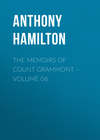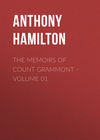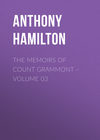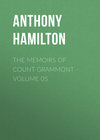Читать книгу: «The Memoirs of Count Grammont – Volume 06»
CHAPTER TENTH
OTHER LOVE INTRIGUES AT THE ENGLISH COURT
The conversation before related was agreeable only to Miss Hobart; for if Miss Temple was entertained with its commencement, she was so much the more irritated by its conclusion this indignation was succeeded by the curiosity of knowing the reason why, if Sidney had a real esteem for her, she should not be allowed to pay some attention to him.
As soon as they retired from the closet, Miss Sarah came out of the bath, where during all this conversation, she had been almost perished with cold, without daring to complain. This little gipsy had, it seems, obtained leave of Miss Hobart's woman to bathe herself unknown to her mistress; and having, I know not how, found means to fill one of the baths with cold water, Miss Sarah had just got into it, when they were both alarmed with the arrival of the other two. A glass partition enclosed the room where the baths were, and Indian silk curtains, which drew on the inside, screened those that were bathing. Miss Hobart's chamber-maid had only just time to draw these curtains, that the girl might not be seen to lock the partition door, and to take away the key, before her mistress and Miss Temple came in.
These two sat down on a couch placed along the partition, and Miss Sarah, notwithstanding her alarms, had distinctly heard, and perfectly retained the whole conversation. As the little girl was at all this trouble to make herself clean, only on Lord Rochester's account, as soon as ever she could make her escape she regained her garret; where Rochester, having repaired thither at the appointed hour, was fully informed of all that had passed in the bathing room. He was astonished at the audacious temerity of Hobart, in daring to put such a trick upon him; but, though he rightly judged that love and jealousy were the real motives, he would not excuse her. Little Sarah desired to know whether he had a real affection for Miss Temple, as Miss Hobart said she supposed that was the case. "Can you doubt it," replied he, "since that oracle of sincerity has affirmed it? But then you know that I am not now capable of profiting by my perfidy, were I even to gain Miss Temple's compliance, since my debauches and the street-walkers have brought me to order."
This answer made Miss Sarah very easy, for she concluded that the first article was not true, since she knew from experience that the latter was false. Lord Rochester was resolved that very evening to attend the duchess's court, to see what reception he would meet with after the fine portrait Miss Hobart had been so kind as to draw of him. Miss Temple did not fail to be there likewise, with the intention of looking on him with the most contemptuous disdain possible, though she had taken care to dress herself as well as she could. As she supposed that the lampoon Miss Hobart had sung to her was in everybody's possession, she was under great embarrassment lest all those whom she met should think her such a monster as Lord Rochester had described her. In the mean time, Miss Hobart, who had not much confidence in her promises never more to speak to him, narrowly watched her. Miss Temple never in her life appeared so handsome every person complimented her upon it; but she received all the civilities with such an air, that every one thought she was mad; for when they commended her shape, her fresh complexion, and the brilliancy of her eyes: "Pshaw," said she, "it is very well known that I am but a monster, and formed in no respect like other women: all is not gold that glisters; and though I may receive some compliments in public, it signifies nothing." All Miss Hobart's endeavours to stop her tongue were ineffectual; and continuing to rail at herself ironically, the whole court was puzzled to comprehend her meaning.
When Lord Rochester came in, she first blushed, then turned pale, made a motion to go towards him, drew back again, pulled her gloves one after the other up to the elbow; and after having three times violently flirted her fan, she waited until he paid his compliments to her as usual, and as soon as he began to bow, the fair one immediately turned her back upon him. Rochester only smiled, and being resolved that her resentment should be still more remarked, he turned round and posting himself face to face: "Madam," said he, "nothing can be so glorious as to look so charming as you do, after such a fatiguing day: to support a ride of three long hours, and Miss Hobart afterwards, without being tired, shows indeed a very strong constitution."
Miss Temple had naturally a tender look, but she was transported with such a violent passion at his having the audacity to speak to her, that her eyes appeared like two fireballs when she turned them upon him. Hobart pinched her arm, as she perceived that this look was likely to be followed by a torrent of reproaches and invectives.
Lord Rochester did not wait for them, and delaying until another opportunity the acknowledgments he owed Miss Hobart, he quietly retired. The latter, who could not imagine that he knew anything of their conversation at the bath, was, however, much alarmed at what he had said; but Miss Temple, almost choked with the reproaches with which she thought herself able to confound him and which she had not time to give vent to, vowed to ease her mind of them upon the first opportunity, notwithstanding the promise she had made; but never more to speak to him afterwards.
Lord Rochester had a faithful spy near these nymphs: this was Miss Sarah, who, by his advice, and with her aunt's consent, was reconciled with Miss Hobart, the more effectually to betray her: he was informed by this spy, that Miss Hobart's maid, being suspected of having listened to them in the closet, had been turned away; that she had taken another, whom in all probability, she would not keep long, because, in the first place, she was ugly, and, in the second, she eat the sweetmeats that were prepared for Miss Temple. Although this intelligence was not very material, Sarah was nevertheless praised for her punctuality and attention; and a few days afterwards she brought him news of real importance.
Rochester was by her informed, that Miss Hobart and her new favourite designed, about nine o'clock in the evening to walk in the Mall, in the Park; that they were to change clothes with each other, to put on scarfs, and wear black-masks: she added, that Miss Hobart had strongly opposed this project, but that she was obliged to give way at last, Miss Temple having resolved to indulge her fancy.
Upon the strength of this intelligence, Rochester concerted his measures: he went to Killegrew, complained to him of the trick which Miss Hobart had played him, and desired his assistance in order to be revenged: this was readily granted, and having acquainted him with the measures he intended to pursue, and given him the part he was to act in this adventure, they went to the Mall.
Presently after appeared our two nymphs in masquerade: their shapes were not very different, and their faces, which were very unlike each other, were concealed with their masks. The company was but thin in the Park; and as soon as Miss Temple perceived them at a distance, she quickened her pace in order to join them, with the design, under her disguise, severely to reprimand the perfidious Rochester; when Miss Hobart stopping her: "Where are you running to?" said she; "have you a mind to engage in conversation with these two devils, to be exposed to all the insolence and impertinence for which they are so notorious?" These remonstrances were entirely useless: Miss Temple was resolved to try the experiment: and all that could be obtained from her, was, not to answer any of the questions Rochester might ask her.
They were accosted just as they had done speaking: Rochester fixed upon Hobart, pretending to take her for the other; at which she was overjoyed; but Miss Temple was extremely sorry she fell to Killegrew's share, with whom she had nothing to do: he perceived her uneasiness, and, pretending to know her by her clothes: "Ah! Miss Hobart," said he, "be so kind as look this way if you please: I know not by what chance you both came hither, but I am sure it is very apropos for you, since I have something to say to you, as your friend and humble servant."
This beginning raising her curiosity, Miss Temple appeared more inclined to attend him; and Killegrew perceiving that the other couple had insensibly proceeded some distance from them: "In the name of God," said he: "what do you mean by railing so against Lord Rochester, whom you know to be one of the most honourable men at court, and whom you nevertheless described as the greatest villain, to the person whom of all others he esteems and respects the most? What do you think would become of you, if he knew that you made Miss Temple believe she is the person alluded to in a certain song, which you know as well as myself was made upon the clumsy Miss Price, above a year before the fair Temple was heard of? Be not surprised that I know so much of the matter; but pay a little attention, I pray you, to what I am now going to tell you out of pure friendship: your passion and inclinations for Miss Temple are known to every one but herself; for whatever methods you used to impose upon her innocence, the world does her the justice to believe that she would treat you as Lady Falmouth did, if the poor girl knew the wicked designs you had upon her: I caution you, therefore, against making any farther advances, to a person, too modest to listen to them: I advise you likewise to take back your maid again, in order to silence her scandalous tongue; for she says everywhere, that she is with child, that you are the occasion of her being in that condition, and accuses you of behaving towards her with the blackest ingratitude, upon trifling suspicions only: you know very well, these are no stories of my own invention; but that you may not entertain any manner of doubt, that I had all this from her own mouth, she has told me your conversation in the bathing-room, the characters you there drew of the principal men at court, your artful malice in applying so improperly a scandalous song to one of the loveliest women in all England; and in what manner the innocent girl fell into the snare you had laid for her, in order to do justice to her charms. But that which might be of the most fatal consequences to you in that long conversation, is the revealing certain secrets, which, in all probability, the duchess did not entrust you with, to be imparted to the maids of honour: reflect upon this, and neglect not to make some reparation to Sir Lyttleton, for the ridicule with which you were pleased to load him. I know not whether he had his information from your femme-de-chambre, but I am very certain that he has sworn he will be revenged, and he is a man that keeps his word; for after all, that you may not be deceived by his look, like that of a Stoic, and his gravity, like that of a judge, I must acquaint you, that he is the most passionate man living. Indeed, these invectives are of the blackest and most horrible nature: he says it is most infamous, that a wretch like yourself should find no other employment than to blacken the characters of gentlemen, to gratify your jealousy; that if you do not desist from such conduct for the future, he will immediately complain of you; and that if her royal highness will not do him justice, he is determined to do himself justice, and to run you through the body with his own sword, though you were even in the arms of Miss Temple; and that it is most scandalous that all the maids of honour should get into your hands before they can look around them.
"These things, madam, I thought it my duty to acquaint you with: you are better able to judge than myself, whether what I have now advanced be true, and I leave it to your own discretion to make what use you think proper of my advice; but were I in your situation, I would endeavour to reconcile Lord Rochester and Miss Temple. Once more I recommend to you to take care that your endeavours to mislead her innocency, in order to blast his honour, may not come to his knowledge; and do not estrange from her a man who tenderly loves her, and whose probity is so great, that he would not even suffer his eyes to wander towards her, if his intention was not to make her his wife."
Miss Temple observed her promise most faithfully during this discourse: she did not even utter a single syllable, being seized with such astonishment and confusion, that she quite lost the use of her tongue.
Miss Hobart and Lord Rochester came up to her, while she was still in amazement at the wonderful discoveries she had made; things in themselves, in her opinion, almost incredible, but to the truth of which she could not refuse her assent, upon examining the evidences and circumstances on which they were founded. Never was confusion equal to that with which her whole frame was seized by the foregoing recital.
Rochester and Killegrew took leave of them before she recovered from her surprise; but as soon as she had regained the free use of her senses, she hastened back to St. James, without answering a single question that the other put to her; and having locked herself up in her chamber, the fast thing she did, was immediately to strip off Miss Hobart's clothes, lest she should be contaminated by them; for after what she had been told concerning her, she looked upon her as a monster, dreadful to the innocence of the fair sex, of whatever sex she might be: she blushed at the familiarities she had been drawn into with a creature, whose maid was with child, though she never had been in any other service but hers: she therefore returned her all her clothes, ordered her servant to bring back all her own, and resolved never more to have any connection with her. Miss Hobart, on the other hand, who supposed Killegrew had mistaken Miss Temple for herself, could not comprehend what could induce her to give herself such surprising airs, since that conversation; but being desirous to come to an explanation, she ordered Miss Temple's maid to remain in her apartments, and went to call upon Miss Temple herself, instead of sending back her clothes; and being desirous to give her some proof of friendship before they entered upon expostulations, she slipt softly into her chamber, when she was in the very act of changing her linen, and embraced her. Miss Temple finding herself in her arms before she had taken notice of her, everything that Killegrew had mentioned, appeared to her imagination: she fancied that she saw in her looks the eagerness of a satyr, or, if possible, of some monster still more odious; and disengaging herself with the highest indignation from her arms, she began to shriek and cry in the most terrible manner, calling both heaven and earth to her assistance.
The first whom her cries raised were the governess and her niece. It was near twelve o'clock at night: Miss Temple in her shift, almost frightened to death, was pushing back with horror Miss Hobart, who approached her with no other intent than to know the occasion of those transports. As soon as the governess saw this scene, she began to lecture Miss Hobart with all the eloquence of a real duenna: she demanded of her, whether she thought it was for her that her royal highness kept the maids of honour? whether she was not ashamed to come at such an unseasonable time of night into their very apartments to commit such violences? and swore that she would, the very next day, complain to the duchess. All this confirmed Miss Temple in her mistaken notions: and Hobart was obliged to go away at last, without being able to convince or bring to reason creatures, whom she believed to be either distracted or mad. The next day Miss Sarah did not fail to relate this adventure to her lover, telling him how Miss Temple's cries had alarmed the maids of honour's apartment, and how herself and her aunt, running to her assistance, had almost surprised Miss Hobart in the very act.
Two days after, the whole adventure, with the addition of several embellishments, was made public: the governess swore to the truth of it, and related in every company what a narrow escape Miss Temple had experienced, and that Miss Sarah, her niece, had preserved her honour, because, by Lord Rochester's excellent advice, she had forbidden her all manner of connection with so dangerous a person. Miss Temple was afterwards informed, that the song that had so greatly provoked her, alluded to Miss Price only: this was confirmed to her by every person, with additional execrations against Miss Hobart, for such a scandalous imposition. Such great coldness after so much familiarity, made many believe, that this adventure was not altogether a fiction.
This had been sufficient to have disgraced Miss Hobart at court, and to have totally ruined her reputation in London, had she not been, upon the present, as well as upon a former occasion, supported by the duchess: her royal highness pretended to treat the whole story as romantic and visionary, or as solely arising from private pique: she chid Miss Temple, for her impertinent credulity: turned away the governess and her niece, for the lies with which she pretended they supported the imposture; and did many improper things in order to re-establish Miss Hobart's honour, which, however, she failed in accomplishing. She had her reasons for not entirely abandoning her, as will appear in the sequel.
Miss Temple, who continually reproached herself with injustice, with respect to Lord Rochester, and who, upon the faith of Killegrew's word, thought him the most Honourable man in England, was only solicitous to find out some opportunity of easing her mind, by making him some reparation for the rigour with which she had treated him: these favourable dispositions, in the hands of a man of his character, might have led to consequences of which she was not aware; but heaven did not allow him an opportunity of profiting by them.
Ever since he had first appeared at court he seldom failed being banished from it, at least once in the year; for whenever a word presented itself to his pen, or to his tongue, he immediately committed it to paper, or produced it in conversation, without any manner of regard to the consequences the ministers, the mistresses, and even the king himself, were frequently the subjects of his sarcasms; and had not the prince, whom he thus treated, been possessed of one of the most forgiving and gentle tempers, his first disgrace had certainly been his last.
Покупайте книги и получайте бонусы в Литрес, Читай-городе и Буквоеде.
Участвовать в бонусной программе



















